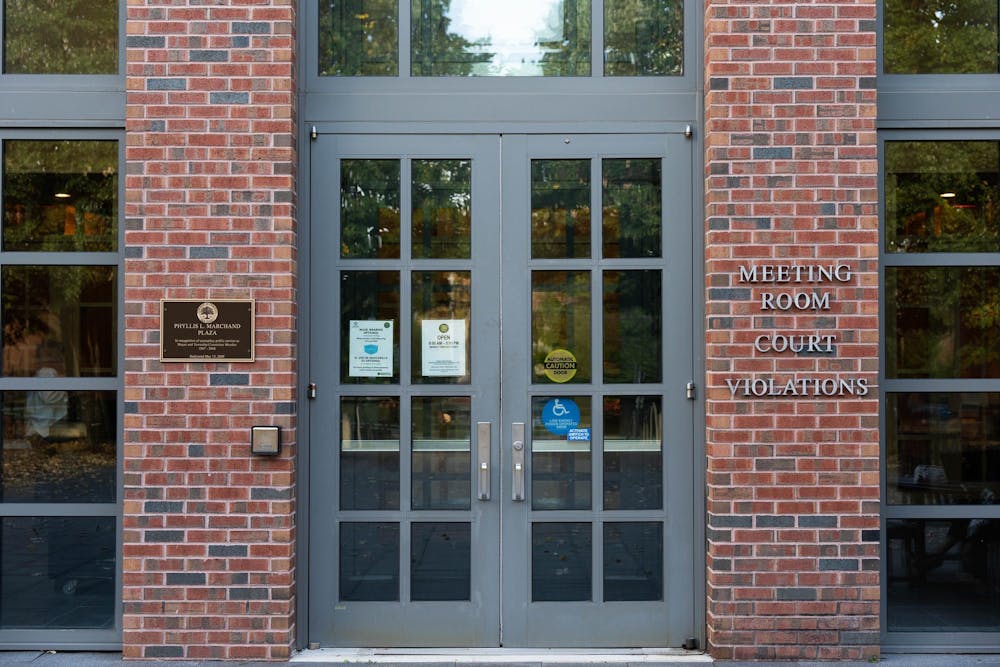At the height of pro-Palestine protests last spring, hundreds of people surrounded Clio Hall as 13 protesters occupied an office inside, ending with the arrest of all 13 inside the building.
Now, those 13 arrestees are all facing charges of defiant trespassing in Princeton Municipal Court, after Judge John McCarthy III ’69 denied the plea deals of six defendants during a Tuesday hearing. Two other students who were arrested after putting up tents on the first day of the “Gaza Solidarity Encampment” protest walked away on Tuesday with a $100 fine, which was waved by McCarthy.
During Tuesday’s hearing, McCarthy questioned protester Sara Ryave ’24 under oath regarding what happened inside Clio Hall from the protesters’ perspective. Over the course of about 15 minutes, Ryave confirmed previously reported information while divulging new information under oath. Here are the highlights.
Protesters sought a meeting with admin
Ryave confirmed under oath that the initial goal of the protesters was to meet with Dean of the Graduate School Rodney Priestley to discuss divestment. She also said that when they found Priestley was not in his office, protesters decided to barricade themselves inside and start the sit-in protest that led to their arrest.
“When he was not there, we chose to stay inside of his office, and we asked University staff members to leave,” Ryave told the courtroom.
As The Daily Princetonian reported at the time, protesters occupied Priestley’s office to pressure negotiations with administration on divestment from Israel. At that point — five days into the encampment — University administrators had not yet met with protesters to discuss their demands nor made any statement about their stance on divestment. The University has since agreed to move towards formally considering divestment, with the Resources Committee of the Council of the Princeton University Community recently opening a feedback portal on the proposal to divest, to establish whether campus consensus exists to move forward with the proposal.
Staff told to exit by an unknown protester

Ryave also spoke under oath about interactions between Graduate School staff and protesters, claiming that protesters asked them to leave after deciding to occupy the office.
Princeton Alumni Weekly (PAW) reported last spring that protesters in the office suite on the first floor of Clio Hall gave staff 60 seconds to leave the office. Anonymous staff members told PAW that protesters then began a countdown. In her testimony on Tuesday, Ryave said she did not recall any such countdown, but she confirmed that someone did ask staff members to leave.
The Department of Public Safety and University officials then considered how to remove all staff from the building, according to PAW’s report, choosing to use the back door. Staff waited to be removed from the building in the vestibule outside of the room the protesters were occupying.
At that point, additional protesters had converged around the doors outside Clio. In a May 1 statement, Professor Ruha Benjamin along with three other faculty present wrote that these protesters “opened up a corridor” for staff to exit the building, staff members recalled that the protesters outside did not initially move to allow staffers to leave.

Claims that they were not organized
Over the three weeks of the “Gaza Solidarity Encampment,” groups like Princeton Israeli Apartheid Divest (PIAD) and Students for Justice in Palestine (SJP) posted about protests, but no single group claimed unilateral responsibility for organizing the sit-in.
Ryave told McCarthy, the judge, that the group of individuals who occupied Clio Hall were not part of any organization and had no unified leadership, making them separate from these other organizations.
Since May, pro-Palestine protesters have described protest actions similarly, denoting that they were organized by an “autonomous group” while promoting the incidents through formal organization accounts. The tact was used to explain the vandalization of the SPIA building/fountain and Nassau Hall in the spring.
Vitus Larrieu is a senior News writer and head Podcast editor for the ‘Prince.’
Isabella Dail is a staff News writer and head editor for The Prospect for the ‘Prince.’
Please send any corrections to corrections[at]dailyprincetonian.com.








